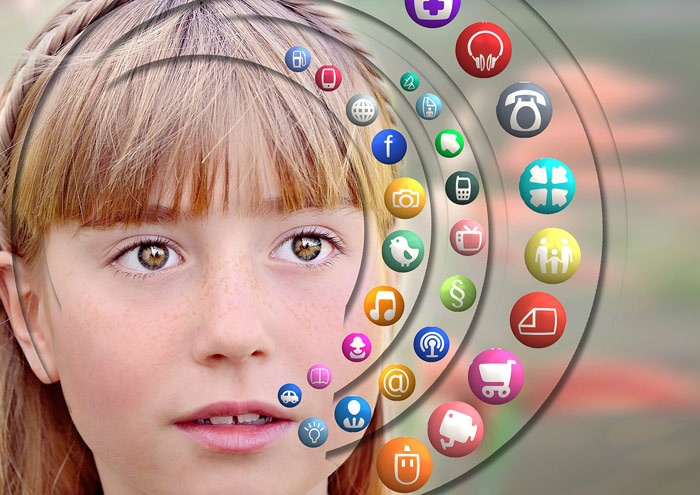Kids & Gadgets: What Is Digital Dementia?
Today, the whole world is obsessed with gadgets: smartphones, tablets and other digital devices. Under such circumstances, the world is flooded with the virus of digital dementia. It’s not a joke – it sounds like a diagnosis. In 2007, experts noticed that more and more children representing the digital generation suffered from attention disorder, memory loss, low self-control, cognitive impairment, depression, and frustration. Studies show that the brains of the digital generation demonstrate changes similar to those occurring after traumatic brain injuries or in the early stages of dementia, which usually develops in old age.

It is hard to believe, but an average European spends more than a year of life in front of the screens by the age of seven, and more than four years by the age of 18 years!
Are you going to say that today’s children are different? Yes, the children are different, but their brain is the same that people used to have a thousand years ago – 100 billion neurons, each of which is associated with ten thousand of other neurons.
How to Develop the Brain?
Our thoughts, actions, solutions to complex problems and deep meditation leave an imprint on our mind. According to British professor of psychology Tanya Byron, nothing can replace the knowledge that children acquire on their own, during their free and independent thinking, exploring the physical world and facing with something new.
Kids Do Not Explore the Outer World Anymore

You’ll be shocked, but the activity radius of children (the space around the house where children are free to explore the surrounding world) has decreased by 90% since 1970! The world has shrunk to a smartphone screen. Children have forgotten and simply do not know what it is to run in the rain, to make paper boats, to climb trees, or just chat with each other. They sit for hours, immersed into their smartphones. But they need to develop their muscles, be aware of the risks that the world has in store for them, and just interact with their friends. Susan Greenfield says it is amazing how quickly an entirely new type of environment has formed, where taste, smell and touch are not encouraged, where most of our time is spent in front of the screen without walking in the fresh air and spending time talking face to face. We definitely have something to be worried about.
The brain is developed when there are external stimuli, and the more stimuli it has the better. Therefore, it is very important for children to explore the world physically rather than virtually. The growing brain needs this, just like a thousand years ago.
Gadgets & Sleep

Besides, a child needs a healthy and restful sleep. But today’s children are not able to abandon the Internet and break away from computer games. This greatly reduces the duration of their sleep and leads to violations. There can hardly be any development when they are tired and have a headache. Even schooling fails to appeal to their minds!
What Changes in the Kid’s Mind?
You may ask how digital technology can change the child’s brain. Firstly, the number of external stimuli is limited because of monotonous surfing the Internet. The child does not receive the required experience to develop critical areas of the brain that are responsible for empathy, self-control, and decision-making. What does not work eventually dies. After all, if someone does not walk, his legs get atrophied. Children are not used to storing information as it is easier to find it in the search engines. This is where memory problems originate from. Children do not train their memory.
Do you think children are much smarter thanks to the Internet? Do you know that today’s eleven-year-olds deal with the same tasks that eight or nine-year-old children could solve easily 30 years ago? The researchers note that one of the main reasons for this is living in the virtual world.
Susan Greenfield fears that digital technology infantilizes our brain, turning it into a brain of small children, who are attracted to buzzing noises and bright light, cannot focus their attention and live from hand to mouth.
How to Protect Your Kids from Digital Dementia?

Just limit the time of using all sorts of gadgets. You’ll be surprised, but Steve Jobs, the guru of the digital industry, actually did this. His kids did not use iPads; they were forbidden to use other gadgets at night and on weekends.
Chris Anderson, editor in chief of the American Wired magazine and one of the founders of 3D Robotics, also limits his children’s use of gadgets. Anderson’s rule is to keep no screens and gadgets in the bedroom! He says he sees the danger of excessive obsession with the Internet better than anyone else. Anderson faced this problem himself and does not want his children to have the same problems.
The Blogger and Twitter services creators let their sons use their tablets and smartphones no more than 1 hour per day, and the manager of OutCast Agency has reduced the use of gadgets at his home to 30 minutes a day. His younger children do not have any gadgets at all.
How to Prevent Digital Dementia in Kids?
Here’s your answer to the question “what can be done?”. Take care of the younger generation. Think about what kind of future awaits them in 10-20 years, if they already spend half a day in front of the screens of their cutting-edge gadgets.
